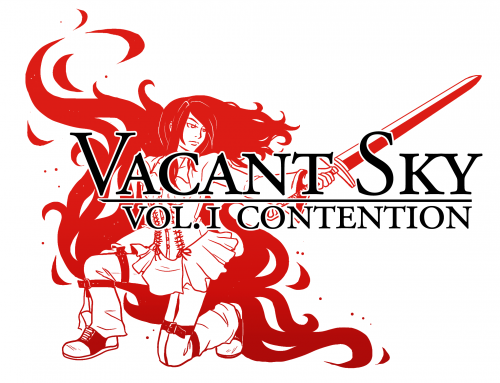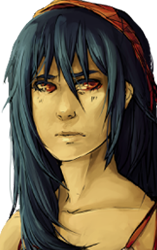In this article, I’m going to discuss my process for developing and fleshing out characters. The example I’ll be using is Mia from Act II. There will be some mild spoilers for Acts I and II, so if you haven’t had the chance to play the game yet and intend to, be warned.
Mia is a character who first appears after the player completes their first major quest in Act II of Vacant Sky. She’s an interesting example because she wasn’t originally part of the story as I first envisioned it. Instead, she was introduced to fulfill a specific need I had in telling the story of Act II.
No Longer Human
Act II of Vacant Sky introduces the concept of an Archon, which is a person who has had another person’s soul grafted to theirs with magic. The exact mechanics of how they function are rather complicated, and I wanted to avoid inundating the player with exposition which they would probably forget. However, understanding what it means to be an Archon is crucial to following the story, so I needed some way to convey it to the player in a way they would engage with and care about.
I puzzled over this for a while when starting to write Act II, and eventually decided to illustrate rather than explain what an Archon is and what it means to live as one. To do that, I began to flesh out a character who would serve as a living embodiment of the concept of Archons.
I started by writing out the key ideas I needed to convey:
-Archons are (sometimes) immortal
-Archons can (sometimes) tap into supernatural powers
-Archons are unnatural
-Archons are prone to fits of ultra-violent rage
-The more an Archon taps into the power of their alternate persona, the more their state of mind deteriorates
-Archons and humans can’t coexist
The angle I decided to take was to have Mia serve as a snapshot of what Auria might look like in the near future. She’s a little older, more experienced, and most importantly, confident. At a time when Auria feels isolated and is struggling to find her place in the world, she encounters Mia, who has undergone many of the same hardships and seems to have everything figured out.
When the player first meets Mia, she is alone on the city streets at night, unkempt-looking, and astonishingly strong (having just single-handedly dispatched a group of thugs who had been harassing her). One of the first things she says to Auria after making sure that she’s unhurt is that she intends to follow the fleeing thugs to finish them off. When Auria demands to know how she can suggest such a thing, Mia is perplexed; to her, it’s the obvious thing to do: if someone’s causing you trouble, you should kill them to ensure they never bother you again.
Mia’s callous but rational thinking demonstrates her lack of respect for human life, a stark contrast from Auria’s idealism. Auria is appalled and afraid, unaware that later in the story, she’ll be required to make a very similar judgment call.
It’s clear from the first interaction with Mia that she lives outside of human society: she makes a distinction between herself and “them” when speaking and shows flagrant disregard for human laws and morality (she steals to eat and doesn’t bat an eye at killing someone when it’s convenient). She suggests that since they’re immortal, they have nothing to fear from humans, and that laws don’t apply to them; on the contrary, laws exist to protect humans from them.
Don’t Ask, Don’t Tell
The introduction of Mia answers a key question on the player’s mind (what exactly is Auria?) but also suggests several more without directly asking them:
-How did Auria become an Archon? When did it happen?
-Why is Mia so convinced that Archons and humans are enemies?
-Does Auria’s mother know that she’s an Archon? Does she know something about what’s going on?
One of the best ways to manipulate the reader is to get them thinking about questions, because they’ll laser-focus in on those questions as they read/play in the hopes of finding answers. This is useful for two reasons: 1) it builds anticipation and 2) it allows you to manipulate expectations.
In this case, building anticipation was one of my key objectives, since the questions were all answered at the turning point of Act II, a major scene which I wanted to be one of the most shocking and memorable moments in the whole Contention saga. By teasing the player with a mixture of anticipation and dread, the mood was set for a grim revelation that would (hopefully) cause the player to feel the same shock and hopelessness as Auria.
The connection between Auria and Mia is key to Act II. Act II serves as a transition for Auria, putting her on track to become like Mia. So, one of the goals of Mia’s introduction was to suggest to the player what Auria would be like at the end of it, and to set the player up with the expectation that they would find out. This serves to indicate to the player what the conceit of the story is and helps to contextualize the events to follow.
Characterization Through Gameplay
One of the unique benefits of the game medium is the ability to convey subtext through a space that the player navigates. Act II of Vacant Sky introduces a day/night system where certain people and places are only available at certain times of day.
For most of the game, the nighttime segments are fairly useless: only one location can be accessed at night, no quests can be done at night, and all of the player’s party members are either at home or just outside. The streets are empty, too. There’s no one to talk to.
This changes in the intermission between major quests. Mia exclusively appears at night, establishing a dichotomy between herself and the rest of the cast. You can only find her when everyone else is gone, when you’re warned that it’s dangerous to go out alone. This serves to enhance Mia’s feeling of otherness, as she alone breaks the pattern that you’ve become accustomed to in playing the game.
As Mia is the only one who provides the player with direct answers about the mysteries of the story, the player is encouraged to be curious about her and anticipate each interaction with her. As it’s never explicitly stated when she’s around, this leads the player to go out into the night (in doing so, disobeying the advice of Auria’s friends - her anchors to human society) and seek her out. The player subconsciously directs Auria into becoming an entity who exists in the lonesome world of the night, just like the mysterious girl they’re pursuing.
The second time Auria meets Mia, she witnesses her Archon powers go out of control, nearly causing the death of one of her friends. This serves as a warning of what will happen if Auria begins relying on her Archon powers too much herself (foreshadowing the ill-fated finale of Act II). However, Auria’s Archon powers are extremely useful in combat and become even stronger as the game progresses. This encourages the player to act out Auria’s part: you’re warned that her powers are evil and dangerous, but they’re just so convenient and satisfying to use that you can’t help relying on them more and more.
In the last stretch of Act II, you finally get Mia in your party. Although it’s normally a rule of the game that everyone in your party is always the same level, an exception is made for Mia, who is always 3 levels higher than Auria. On top of that, her stat build will always be the perfect complement to Auria’s, making it so that the two of them form a brutally efficient team. Her role in battle reaffirms her role in the story as Auria’s closest ally and the one who’s most like her. With Mia at your side, you can take down anyone. You’re not afraid, even when you fight a group of five soldiers equipped with Counter. The easy triumph over enemies that had once been extremely difficult helps put the player in Auria’s head; for the first time, she feels safe and in control, able to do anything with Mia at her side.
One Last Subversion
The final segment with Mia comes with one more departure from the patterns that the game has established. It takes place at twilight, the first time it’s been anything other than day or night. The track that plays in this section is “Last Night of Summer,” which previously played during the nighttime segment of Act I, a reminder that you’re still partially within the domain of the night.
The twilight of East Naven serves to illustrate that Auria (an entity of the day) and Mia (an entity of the night) have come together in the middle. The events of the game have dragged Auria toward Mia’s darkness, but at the same time, interacting with Auria, her first true friend, has pulled Mia out of the lonely emptiness of the night toward the domain of the day.
The twilight is calming, safe, and a little melancholy. There are people around, but the muted colors and somber music suggest that this isn’t quite the upbeat, welcoming world that the day normally is. It’s here, in the twilight, that Auria and Mia reach their resolve about what to do with their lives.
(The events of Act II’s finale, of course, wipe away the twilight and replace it with a fourth rendition of East Naven, barren and hopeless. The twilight period is never seen again in Act III: There can be no middle of the road.)
This was a little long-winded, but I thought I’d give an insight into how I develop characters and how I try to convey their characterization through the player’s interactions with the game. Hopefully, you found it interesting.


 RPG Maker XP
RPG Maker XP

















:origin()/pre03/c3c3/th/pre/f/2013/030/e/f/anime_render_by_feary_bad_day-d5tb73j.png)


